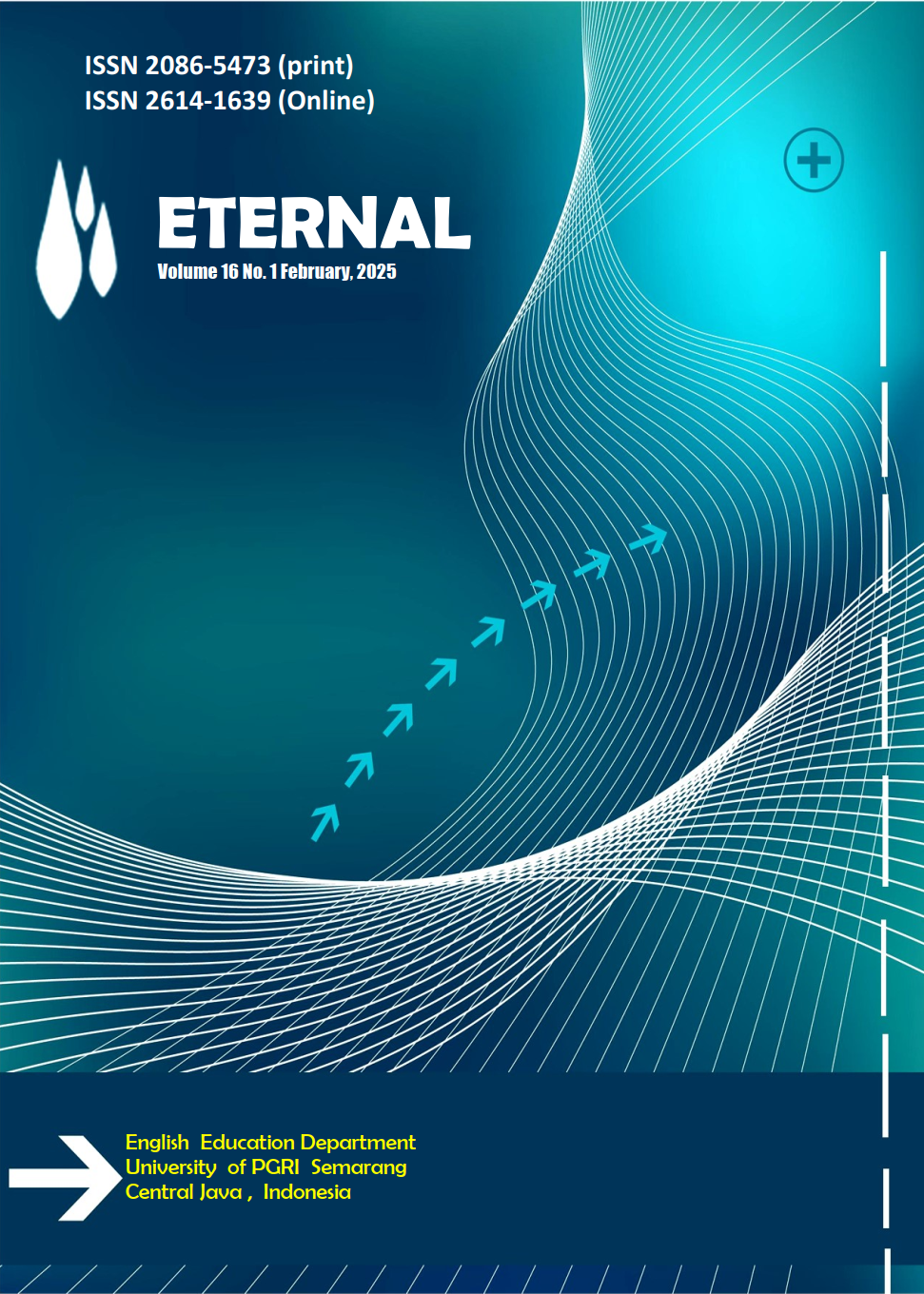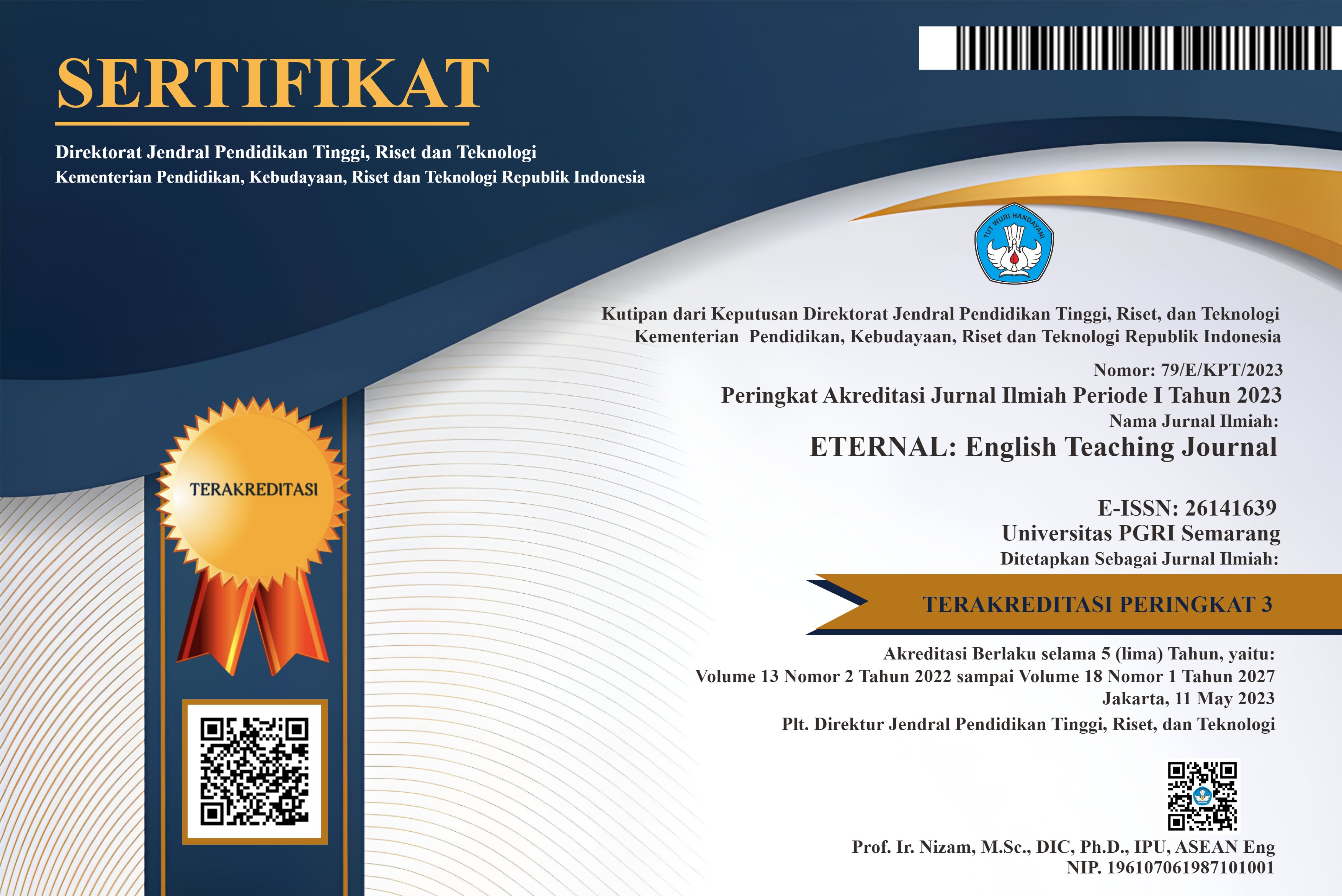Bridging the Gap: Pre-Service Teachers’ Realities of Technology Integration in the Digital Classroom
DOI:
https://doi.org/10.26877/8e0app73Keywords:
Pre-service teachers, technology integration, digital pedagogy, TPACK frameworkAbstract
In the digital era, integrating technology into education is essential for preparing future-ready educators. This qualitative case study explores how pre-service teachers experience and implement digital tools in instructional settings. It focuses on their successes, challenges, and the pedagogical strategies they employ. Drawing on the Technological Pedagogical Content Knowledge (TPACK) framework and experiential learning theory, the study involved 15 pre-service teachers from a university in Semarang. Data were collected through semi-structured interviews and classroom observations, and analyzed using thematic analysis. The findings reveal that pre-service teachers primarily used technology to manage classrooms and engage students—for example, using interactive platforms like Kahoot! to maintain attention and assess understanding in real time. These tools influenced student reactions and led teachers to adapt their instructional strategies dynamically. While digital tools were seen as effective for promoting engagement and understanding, participants faced challenges related to digital literacy, infrastructure limitations, and a lack of mentorship. Technology-based assessment and proactive engagement strategies were less frequently applied, highlighting a gap between theoretical training and classroom practice. The results suggest that teacher education programs should provide more hands-on, guided experiences, reflective practices, and institutional support to develop digital teaching competence. This study contributes to ongoing efforts to align teacher training with the realities of technology-enhanced learning environments
References
Here's your bibliography, with a single line break between each entry:
Abdulayeva, A., Zhanatbekova, N., Andasbayev, Y., & Boribekova, F. (2025). Fostering AI literacy in pre-service physics teachers: inputs from training and co-variables. Frontiers in Education, 10. https://doi.org/10.3389/feduc.2025.1505420
Agyei, D. D., & Voogt, J. M. (2011). Exploring the potential of the will, skill, tool model in Ghana: Predicting prospective and practicing teachers’ use of technology. Computers & Education, 56(1), 91–100. https://doi.org/10.1016/j.compedu.2010.08.017
Braun, V., & Clarke, V. (2024). Supporting best practice in reflexive thematic analysis reporting in Palliative Medicine: A review of published research and introduction to the Reflexive Thematic Analysis Reporting Guidelines (RTARG). Palliative Medicine, 38(6), 608–616. https://doi.org/10.1177/02692163241234800
Chai, C. S., Koh, J. H. L., & Tsai, C.-C. (2010). Facilitating Preservice Teacher’Development of Technological, Pedagigical, and Content Knowledge (TPACK). Educational Technology and Society, 13(4), 63–73.
Ertmer, P. A., & Ottenbreit-Leftwich, A. T. (2010). Teacher Technology Change: How Knowledge, Confidence, Beliefs, and Culture Intersect (Vol. 42, Issue 3). www.iste.org/jrte
Graham, C. R., Borup, J., & Smith, N. B. (2012). Using TPACK as a framework to understand teacher candidates’ technology integration decisions. Journal of Computer Assisted Learning, 28(6), 530–546. https://doi.org/10.1111/j.1365-2729.2011.00472.x
Kim, H.-S., Cha, Y., & Kim, N.-Y. (2020). Impact of Mobile Interactions with AI on Writing Performance. Modern English Education, 21(2), 1–13. https://doi.org/10.18095/meeso.2020.21.2.1
Koehler, M. J., & Mishra, P. (2009). What is technological pedagogical content knowledge? Contemporary Issues in Technology and Teacher Education (Vol. 9, Issue 1). http://www.tpck.org/.
Kolb, D. A. (2015). Experiential Learning- Experience as the Source of Learning and Development (2nd Edition). In Person Education, Inc. (Vol. 53, Issue 9).
Listiyoningsih, S., Hidayati, D., & Winarti, Y. (2022). Strategi Guru Menghadapi Transformasi Digital. Jurnal Ilmiah Profesi Pendidikan, 7(2b), 655–662. https://doi.org/10.29303/jipp.v7i2b.389
Mishra, P. (2019). Considering Contextual Knowledge: The TPACK Diagram Gets an Upgrade. In Journal of Digital Learning in Teacher Education (Vol. 35, Issue 2, pp. 76–78). Routledge. https://doi.org/10.1080/21532974.2019.1588611
Pitura, J., Kaplan-Rakowski, R., & Asotska-Wierzba, Y. (2024). The VR-AI–Assisted Simulation for Content Knowledge Application in Pre-Service EFL Teacher Training. TechTrends. https://doi.org/10.1007/s11528-024-01022-4
Polly, D., Mims, C., Shepherd, C. E., & Inan, F. (2010). Evidence of impact: Transforming teacher education with preparing tomorrow’s teachers to teach with technology (PT3) grants. Teaching and Teacher Education, 26(4), 863–870. https://doi.org/10.1016/j.tate.2009.10.024
Sun, Y., Strobel, J., & Newby, T. J. (2017). The impact of student teaching experience on pre-service teachers’ readiness for technology integration: A mixed methods study with growth curve modeling. Educational Technology Research and Development, 65(3), 597–629. https://doi.org/10.1007/s11423-016-9486-x
Tondeur, J., Scherer, R., Siddiq, F., & Baran, E. (2020). Enhancing pre-service teachers’ technological pedagogical content knowledge (TPACK): a mixed-method study. Educational Technology Research and Development, 68(1), 319–343. https://doi.org/10.1007/s11423-019-09692-1
Vellonen, V., Sointu, E., Valtonen, T., & Tukiainen, M. (2025). Pre-Service Special Education Teachers’ Perceptions of Applying Technologies in Education. Journal of Special Education Technology. https://doi.org/10.1177/01626434251314044
Wang, A. Y. (2022). Understanding levels of technology integration: A TPACK scale for EFL teachers to promote 21st-century learning. Education and Information Technologies, 27(7), 9935–9952. https://doi.org/10.1007/s10639-022-11033-4
Zeng, Y., Wang, Y., & Li, S. (2022). The relationship between teachers’ information technology integration self-efficacy and TPACK: A meta-analysis. Frontiers in Psychology, 13. https://doi.org/10.3389/fpsyg.2022.1091017







